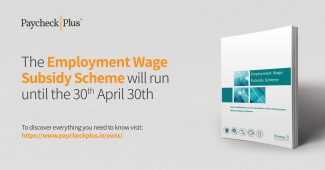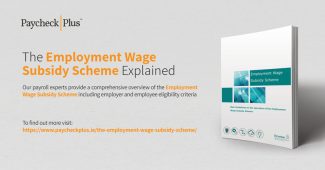Challenging Times for Payroll Processors Ahead
With lockdown restrictions easing across Ireland and COVID-19 recovery running ahead of schedule, businesses and payroll processors are optimistic that a return to “normal” is now within sight.
Although a safe return to the ‘new normal’ is welcomed by payroll companies and businesses in general, it is likely that the transition from the suspended state of temporary closure to ‘business as usual’ will prove complex, not least for payroll processors, payroll companies and payroll bureaus.
As recession looms, redundancies are sadly inevitable, and with income tax changes mooted to address the budget deficit, wage subsidy schemes winding down and COVID-19 remaining a significant threat, one thing of which we can be certain is that the coming months will bring unprecedented change and challenge for all organisations, as well as their payroll processors, payroll companies and payroll bureaus. In this article we examine how these changes could significantly disrupt and burden the payroll services.
Managing Temporarily Laid Off Employees
When the Temporary COVID-19 Wage Subsidy Scheme was rolled out, the question of what would happen when temporarily laid off employees returned to work was hotly debated within payroll departments, payroll companies, payroll services, and outsourced payroll providers, throughout the country.
As temporarily laid off employees begin to return to work, payroll processors, payroll companies and payroll bureaus will need to review payments made as part of the Temporary COVID-19 Wage Subsidy Scheme. With over 60,000 employers registered with Revenue for the Scheme, and more than 527,300 employees receiving at least one Wage Subsidy payment internal payroll processors and payroll bureaus will need to ensure that employee pay rates are reinstated to their pre-subsidy levels once the scheme has expired or the employer is no longer eligible for support. In particular payroll processors will need to ensure that all returning employees are correctly reinstated to the appropriate PRSI class post-subsidy. This will be a significant undertaking for many payroll service departments.
But the situation is further complicated by the taxation of the Wage Subsidy Scheme payments. Employee wages are typically liable to Income Tax and Universal Social Charge (USC) in real-time, with deductions made through the PAYE system. However, payments made via the Wage Subsidy Scheme are not taxed in real-time rather the taxable amount on the subsidy is subject to review from Revenue at the end of the year. This is likely to add to the confusion for many payroll departments and may create significant administrative burden on in house payroll services in the form of employee queries.
Redundancies or Contract Changes
With the Irish economy forecast to contract by 7.9% in 2020 and unemployment set to increase from 5% to 7.4%, job losses as a direct result of the coronavirus pandemic are sadly inevitable. Temporary business closure, loss of trade, and general economic malaise are likely to lead to wage cuts, lay-offs, short-time hours and recruitment freezes as companies strive to reduce spending and ride out tough trading conditions.
From a payroll service perspective, this will increase workload in several ways. Firstly, changes to pay rates, benefits or working hours will need to be implemented and internally audited to ensure they have been actioned correctly. Regrettably, redundancy calculations and payments will also be required, many of which will be affected by the changes to redundancy rules during the COVID-19 emergency period. This is likely to generate a significant uplift in the number of leavers for many business, leading to greater administrative workload for payroll processors as they work to ensure the PRSI Weeks and other payslip information has been pro-rated accurately and annual leave entitlements are correctly calculated.
There is also the potential for organisation’s internal payroll service to be further put-upon by payroll staff redundancies. This likelihood will result in increased workload on the remaining payroll processors within the payroll department.
Additionally, organisations should be especially mindful of disenfranchised and disgruntled employees having access to highly confidential salary, benefits and contractual information at this time. Should this situation occur, management should take steps to ensure that the security of personally-identifiable data is protected at all times from unauthorised access or dissemination.
Income Tax Reform
A feature of recessions worldwide is their ability to drive tax reform, whether to spur economic recovery or to pay for the measures taken to ward off the worst of income inequality.
Following the financial crisis of 2008, Ireland witnessed tax and healthcare reform through the introduction of the Universal Social Charge. This charge was established to help shore up a large deficit in public finances and replaced both the income levy and health contribution. Similarly, the need to accelerate the revenue collection process led to the modernisation of Ireland’s PAYE system and the introduction of real time reporting (RTT) as a way to improve efficiency and streamline the PAYE process in the aftermath of the 2008 financial crisis.
With April’s Stability Programme Update from the Irish Government predicting a €30bn deficit in 2020 resulting from the effects of the coronavirus pandemic, the prospect of a deep recession looms large, and there is every reason to believe that this could lead to tax reform, as per previous economic downturns. For payroll departments, payroll companies, payroll services, and outsourced payroll providers, this may mean yet more changes to reporting systems, tax calculations and payment processing, all of which will increase workload, require compliance monitoring, and potentially facilitate the need for further training.
A Second Wave and Departmental Contagion
Following the easing of lockdown regulations and the recommencement of the retail and hospitality industries in particular, experts such as Professor Gerry Killeen, Research Chair in Applied Pathogen Ecology at the School of Biological, Earth and Environmental Sciences in University College Cork, are concerned that congregations of individuals in relatively confined spaces could lead to a second wave of the virus. While social distancing and health and safety protocols will reduce this risk, in the absence of a vaccine COVID-19 will remain a significant threat and the prospect of a second wave persists.
This threat is compounded by the risk of departmental contagion, whereby returning to work in close proximity with colleagues could lead to entire departments needing to self-isolate in the event that one or more members of the team contract coronavirus. Not only could this cause operational disruption, but departmental contagion and self-isolation will affect the administration of payroll, as payroll processors need to process subsequent illness benefits as well as support and subsidy schemes as they become permanent features of payroll administration whilst coronavirus persists.
Annual Leave
During the COVID-19 lockdown, the amount of holiday taken by employees either working from home is likely to have been minimal, which will likely result in an influx of annual leave requests upon return. These requests need to be processed, and each employee’s revised entitlement calculated, and so annual leave – and specifically the calculation of annual leave entitlement and the processing of requests – will add another layer of complexity to payroll calculations and increase workload and the potential for error for the in house payroll processors.
Those who work within payroll are also likely to have a disproportionate amount of annual leave to take before the end of the financial or calendar year as a result of the lockdown. With post-COVID workload at a peak, many payroll departments may find that they are having to balance unprecedented demands on their time with less available resource, which will likely spur many organisations into payroll outsourcing.
How Can We Help?
The coming months are likely to prove challenging for organisations throughout Ireland, with the payroll processors in the frontline. Employing an outsourced payroll company such as Paycheck Plus to partner with your business will give your team the extra resource you need to effectively manage the disruptions that your organisation will encounter during this difficult time. By using a payroll company or payroll outsourcing service, you can rest assured that any sudden changes in tax, legislation or circumstance will be met readily and processed efficiently to ensure compliance.
For more on COVID and the EWSS Read
About Paycheck Plus
Paycheck Plus is an award-winning payroll services and payroll outsourcing provider, serving businesses across the UK and Ireland. As an experienced payroll bureau, we provide comprehensive, ISO accredited, cost effective payroll outsourcing services to organisations of all sizes. Specialising in all aspects of payroll outsourcing, our team of payroll experts can calculate and process your payroll data and Employers’ PAYE Return, including Income Tax payments, Universal Social Charge (USC) administration, Pay Related Social Insurance (PRSI) payments, Local Property Tax (LPT) deductions, pension scheme administration, benefit in kind returns and other complex payroll services. To request a quote or speak to one of our resident payroll experts click here.



